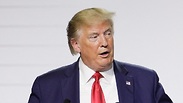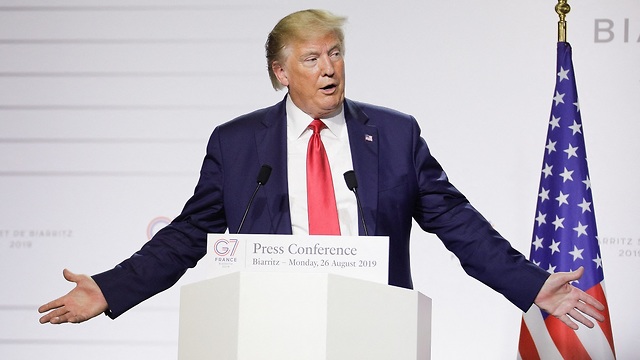
Trump-Rouhani summit seen as cause for concern in Israel
Israeli officials fear they would not be in position to exert pressure on a president that has already showered them with so much, if he fails to include conditions they see as crucial in any future U.S.-Iran nuclear deal
Jerusalem's main concern is its difficulty to gage where a meeting between the two presidents may lead.
Israeli officials say the possibility that Rouhani will meet with his American counterpart before sanctions on Iran are lifted could be seen as an Iranian capitulation.
Tehran has consistently demanded that sanctions reimposed by Trump after he pulled out of the 2015 nuclear deal be lifted before any progress on talks can be made.
Israeli officials fear that Trump will, as he did with North Korea, give more credence to the actual meeting of the leaders, which will then be followed by a milder tone in public statements.
Nonetheless, the same sources note, sanctions on North Korea have remained in place despite the niceties.
U.S. Vice President Mike Pence called to discussed events with Prime Minister Benjamin Netanyahu soon after the president's statements, and then tweeted support for Israel on Monday night.
Officials in Jerusalem warn Israel's special relationship with the American president could become an impediment, should Trump reach a new deal with Iran that does not include elements critical to Israel, such as ending Tehran's missile program and its continued support for terrorism and extremists in the Middle East.
Israel would be at a disadvantage, the officials say, to exert pressure on the president who has already provided the Jewish State with many gestures and benefits.
There may also be some positive outcomes from a Trump Rouhani summit, some say.
The U.S. demands of Iran were laid out in Secretary of State Mike Pompeo's speech last year that included Iran:
• End its proliferation of ballistic missiles and halt further launching or development of nuclear-capable missile systems.
• End support to Middle East "terrorist" groups, end its threatening behavior against its neighbors, many of whom are US allies, end the Islamic Revolutionary Guard corps' support for "terrorists" and "militant" partners around the world.
• Stop enrichment and never pursue plutonium reprocessing, including closing its heavy water reactor.
"We understand Iran is not going to just disappear," said the official.
"Israel wants an end to the Iran's nuclear program.” "Israel wants an end to the Iran's nuclear program.”
He said he is relatively calm because Trump is advised by Pompeo and his national security adviser John Bolton, both of whom advocate a very hawkish policy towards Iran.
Even so, the Israeli official conceded, "we do have some concerns because we don't really know what will happen.”
The official said that Israel would have preferred a resumption of talks not to have been raised now, because the sanctions imposed by the U.S. on Iran are working and a few more months them would, in his view, had made Tehran recognize the need to compromise. Now that is no longer likely.
A second official saw a way forward that might stop further escalating tensions between Israel and Hezbollah, as the Iranian-backed Lebanese terror group would have no interest in risking the summit.
As for the actual meeting Trump and Rouhani, the official saw an opportunity but also a problem, since French President Emmanuel Macron has apparently sided with Iran and has made it more difficult for the United States to break Iranian resistance.
"France is keeping the Iranians alive and has opposed sanctions," the official noted. He added that only someone as aggressive as Donald Trump may be able to get concessions out of Tehran, in contrast to the negotiating abilities of his predecessor.
Even in the event that these starting positions are not kept, any deal reached will be better than the one signed by Obama in 2015.












